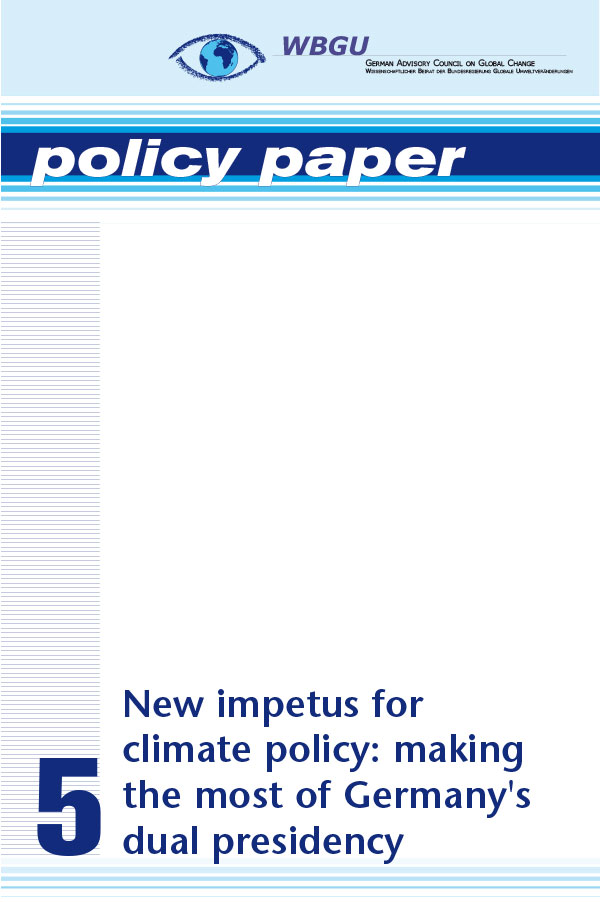
Policy Paper
New impetus for climate policy: making the most of Germany's dual presidency

If dangerous climate change is still to be avoided, a reversal of current trends must be achieved within the next ten years, and greenhouse gas emissions worldwide must be halved by 2050 compared with a 1990 baseline.
Overview
However, there is a widening gap between the action that is urgently needed and current climate policy. The German Advisory Council on Global Change (WBGU) is therefore convinced that a new climate policy dynamic is required worldwide. Currently, all eyes are on Germany: its Presidency of the Council of the European Union and Presidency of G8 offer a dual opportunity to drive climate protection forward. The Council‘s core messages are as follows:
- Climate protection is both worthwhile and feasible: Investing in climate protection is economically efficient, as the costs of effective climate protection are far lower than the costs of inaction. The longer we delay, the more expensive climate protection will become. For successful climate protection, a transformation of the world‘s energy systems is key. Such a transformation is technologically feasible, marking a shift away from fossil towards renewable energy sources, and requires rapid utilization of the high efficiency potentials.
- Further development of the UN climate convention: A consensus on the mitigation target must be forged and enshrined in the convention. To this end, the Council recommends the adoption of a global temperature guard rail limiting the rise in near-surface air temperature to a maximum of 2 °C relative to the pre-industrial value – equivalent to stabilizing the concentration of greenhouse gases below 450 ppm CO2eq. The Kyoto Protocol must be developed further and offer effective incentives for the transformation of energy systems. The industrialized countries should commit to ambitious reduction targets, while mechanisms must be established for the progressive, but differentiated integration of the newly industrializing and developing countries into commitment regimes. The issue of adaptation must also be given appropriate priority. This must include firm pledges from the industrialized countries on technological cooperation and financing.
- Making the most of the G8 Summit at Heiligendamm: Fresh initiatives from the heads of state and government are required to inject new life into the faltering climate process. The G8 countries and the five major newly industrializing countries, as the world‘s leading political and economic nations, should now send out clear signals and agree an ‚innovation pact on decarbonization‘. By adopting joint parameters for efficiency and CO2 emissions standards, developing a Road Atlas for the decarbonization of energy systems, and promoting technological cooperation, the G8+5 countries have the potential to become the driving force in international climate policy.
- Reaffirming the European Union‘s leading role: The European Union should expand its leading role in international climate protection. To maintain its credibility, it must achieve its agreed emissions reduction targets. The EU must demonstrate the viability of climate protection and provide fresh impetus for energy efficiency and renewables worldwide. The European Union‘s Emissions Trading Scheme should be developed further and improved as a matter of urgency.
More on the Subject
Press Release
Breaking through in climate policy!
PDF Downloads
Neue Impulse für die Klimapolitik: Chancen der deutschen Doppelpräsidentschaft nutzen
- Download: Vollversion (PDF, 418 KB)
New impetus for climate policy: making the most of Germany's dual presidency
- Download: Full Version (PDF, 414 KB)